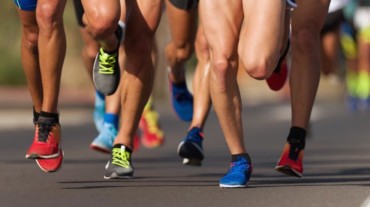
Marathon may seem like a straightforward job, but it’s not! Turns out, months of training and preparation go into a Marathon and not just finding the perfect shoes. There are several things you need to look out for when you are planning on going for a marathon. One of the major things you need to focus on is staying hydrated. Proper hydration is crucial for running marathons to avoid any sort of health complications. Here’s how you can stay hydrated during a marathon.
Health Shots asked Dr Anil G Ballani, Senior Consultant Internal Medicine, to help us understand why staying hydrated during a marathon is important and how you can do it.
When you run, your body temperature rises, causing increased sweat production and fluid loss. Without adequate hydration, runners risk the negative effects of dehydration, such as muscle cramps, dizziness, and even heat stroke. Staying properly hydrated during a run can help maintain optimal heart function and circulation, allowing muscles to work more efficiently, says Dr Ballani.

Plus, proper hydration plays a key role in maximising performance and recovery. Dehydration can lead to decreased levels of energy and impaired cognitive function, which can affect your running technique as well as your endurance. A study published in the journal Nutrients found that a reduction in body mass due to dehydration can lead to mood swings and fatigue. Staying well hydrated before and during a run will enhance overall athletic capacity and promote faster muscle recovery post-exercise. Maintaining proper hydration while running will not only quench your thirst but to optimize physical capabilities that will improve peak performance.
Here are some expert-approved tips to ensure that you are properly hydrated during a marathon:
As mentioned, proper hydration is key to completing a marathon without wearing yourself out. The best way to keep yourself hydrated is by including both water and electrolyte-rich fluids which are crucial in preventing dehydration. Additionally, consuming small sips of fluids at regular intervals during the race rather than chugging large quantities at once can keep you hydrated without causing discomfort, says Dr Ballani.
Water might be the most important, but it is not the only way to keep yourself hydrated. While many runners focus on drinking water, incorporating hydrating foods into your diet can also be incredibly beneficial. You can incorporate hydrating foods such as watermelon, cucumber, and oranges into your pre-marathon meals which can help contribute to overall hydration.
Chia seeds are an excellent hydrating food that you can add to your diet. When mixed with water, these small seeds form a gel-like consistency that helps retain moisture in the body. Adding chia seeds to your pre-run meal or snack can provide long-lasting hydration and support endurance during your run. Incorporating these hydrating foods into your diet not only supports your running performance but also contributes to overall health and well-being.

While you can drink more water and eat more hydrating foods, it is important to be mindful of environmental factors such as temperature and humidity. “Moreover, practicing hydrating techniques during training runs can help you understand your body’s individual needs and fine-tune your hydration approach for race day. These strategies combined can play a significant role in boosting performance and preventing fatigue during a long-distance run” advises the expert.
The amount of water you should drink during a marathon depends on various factors, including your individual needs, the weather conditions, and your level of exertion. Dehydration can negatively impact your performance, so it’s essential to stay adequately hydrated.
Select Topics of your interest and let us customize your feed.
PERSONALISE NOW17-20 ounces of water 2-3 hours before the race, 8 ounces 20-30 minutes before the race, and 7-10 ounces every 10-20 minutes during the race. However, these are just general recommendations, and individual needs can vary. It’s crucial to listen to your body and drink when you feel thirsty. Some runners may need more or less water, and factors like temperature, humidity, and personal sweat rate can influence your hydration needs. Overhydration (hyponatremia) is also a concern, so be cautious not to drink excessively, advises the expert.
Get Latest Updates on How To